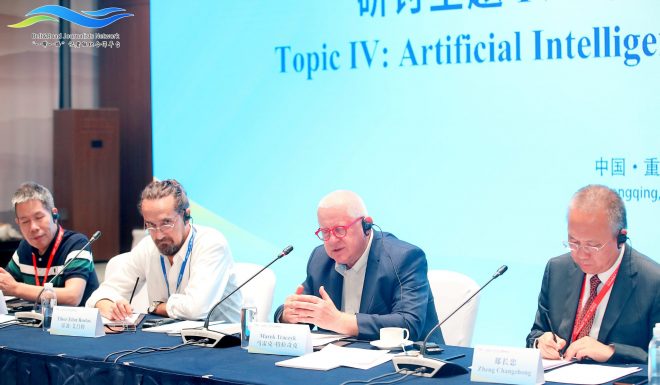On August 30, leaders from journalist organizations and media outlets engaged in discussions covering multiple fields, including artificial intelligence (AI), green development, South-South Cooperation among developing countries, and culture.
Artificial intelligence emerged as a central topic of discussion. Denisa Petrilaková, President of Czech Media Agency, said: “AI must never become our master,” highlighting AI’s role as a double-edged sword with both benefits and potential risks.

Global journalists were discussing AI. (Photo/2024 Belt and Road Journalists Forum)
AI offers benefits like increased productivity, enhanced communication, and societal progress. However, it also brings potential drawbacks, such as job disruptions, loss of control, and possible impacts on youth’s cognitive abilities and social influence.
To balance AI’s advantages and disadvantages, Moritz Lohmann, Co-founder of Hamburg Welcomes You, stated that journalists need to form an alliance that promotes the conscious use of AI.
Participants widely agreed that media should maintain professional ethics in AI reporting, ensuring content legitimacy and accuracy while advocating for essential legal and ethical guidelines for AI development.
Derese Ayele, Executive Director of the Editors Guild of Ethiopia, noted that no country can avoid the issue of green development, highlighting the need for international cooperation.
Peng Guochuan, Director of the Institute for Ecology and Environmental Resources, Chongqing Academy of Social Sciences, stated that to achieve green development goals, vigorous development of green and low-carbon industries, such as big data, is essential.
“For example, we can create biodiversity networks across Belt and Road countries and leverage remote technology to enhance monitoring,” said Dai Yunchuan, Researcher at Chongqing Academy of Social Sciences.
Regarding South-South Cooperation, the media were seen as more effective in amplifying the voices of Southern (Global South) countries and sharing their unique experiences despite challenges in the global media environment.
As a country in the Global South, overcoming constraints imposed by the Global North is crucial. Emphasizing the strengths of developing countries is important, as each possesses unique advantages, noted Ahmed Salem Kassab Salem, Head of Central Administration/Media Advisor at the State Information Services in Egypt.
He added that examining the living conditions within one’s own developing country is also essential. Southern countries, with larger markets and more people, should be the world’s main focus.
The seminar also explored innovative methods for enhancing publicity in South-South Cooperation, such as utilizing platforms like the Belt and Road Journalists Forum and applying digital and intelligent technologies to enhance communication effectiveness and coverage.
The discussion on cultural exchanges also covered the media’s role in preserving and innovating multicultural heritage. For instance, Apollinaire Niyirora, a Burundi National Radio, and Television reporter shared his experience observing the pottery firing process in Rongchang, Chongqing. He suggested that media promotion could aid in modernizing traditional crafts, such as Burundian ceramics.
Source: Bridging News
Article By Huxin Luo,Ran Zheng
Managing editor:Vivian Yan
